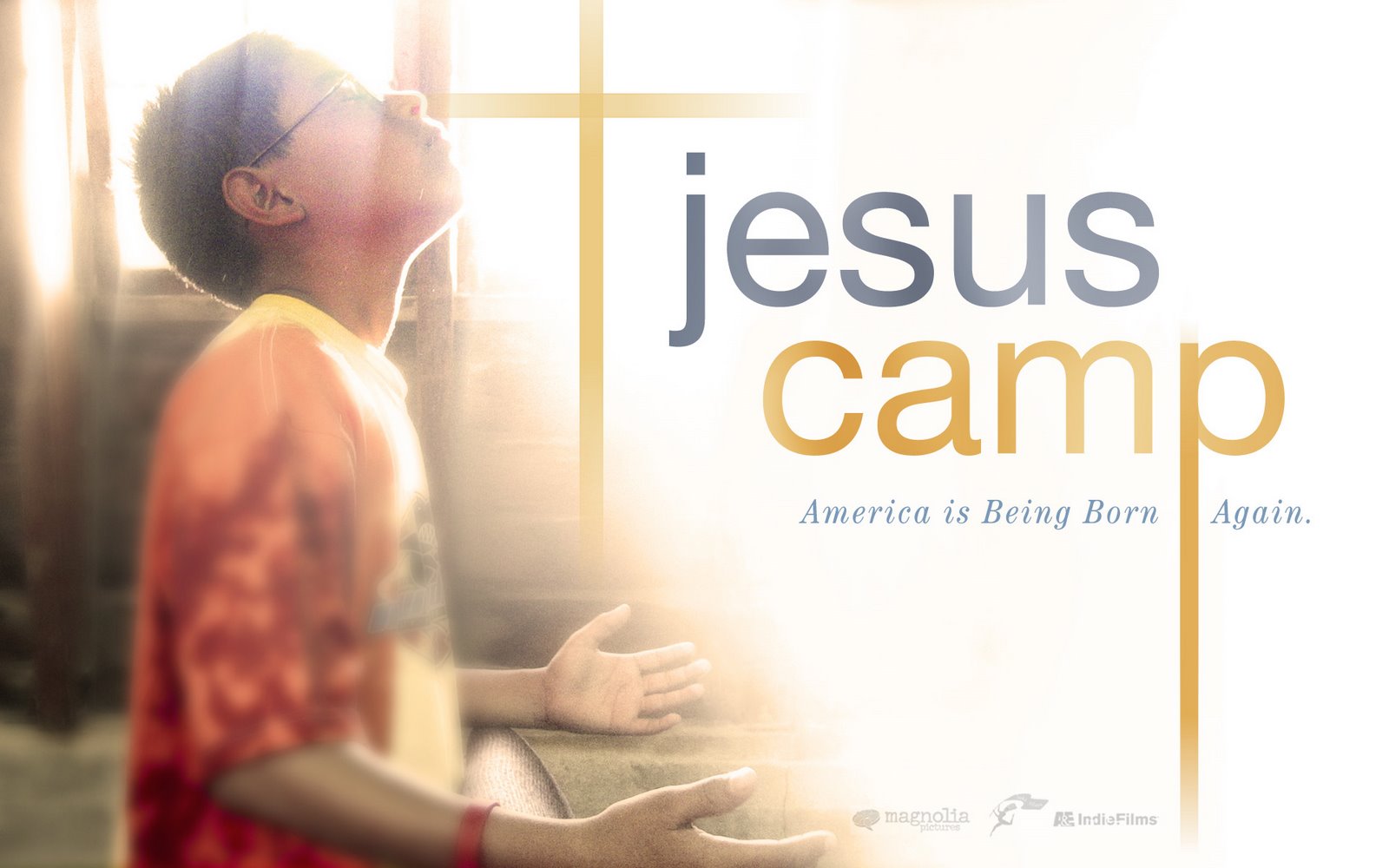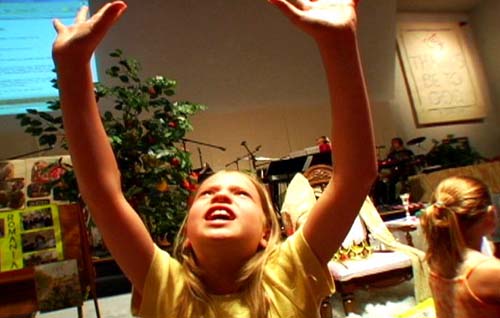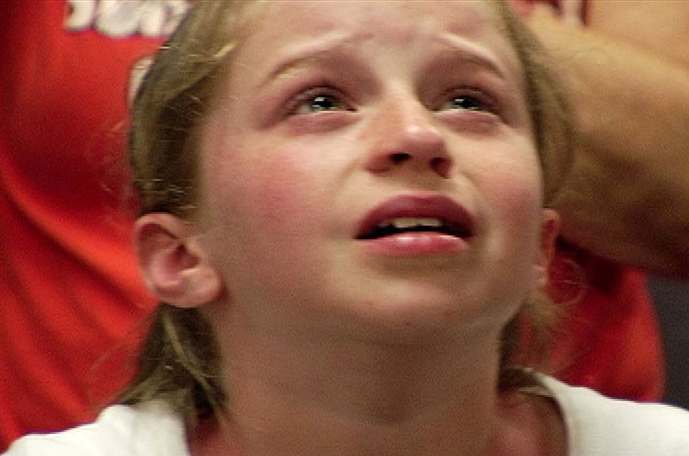
"Jesus Camp" is an illuminating documentary film portraying a Pentecostal youth camp, Kids on Fire, where children are aggressively instructed that they are the ones who will one day return America to righteousness and purity. They are trained to be soldiers of Jesus. At the camp, the children raise their arms in praise, weep over the depth of their hypocrisy and sin, speak in tongues, entrust their lives to Jesus Christ, and make covenants to bring others to Christ and to end abortion.

The images of these children experiencing such intense instruction are powerful. So are the interviews with the camp's minister, Becky Fischer, a single-minded, energetic, deeply devoted, passionate, emotional fundamentalist. Likewise, the interviews with parents help solidify the reasons and the emotions that undergird the children's involvement at the camp and their involvement in this particular expression of Pentecostal practice and faith.
"Jesus Camp" is directed by Heidi Ewing and Rachel Grady, neither Christian. They entered this project curiously, wanting to learn more about fundamentalism and what this particular expression of Pentecostalim looks like from the children's perspective, juxtaposed with the adult perspective of the parents and of Becky Fischer.
I listened to an interview, here, with the directors a day or two before I watched the movie. They discussed how hard they worked to present a fair accounting of the camp and the social, political, and religious context of these Christians.
In part, I think they succeeded. The participants in the movie agree. Ewing and Grady screened the movie for all of them before it was released. The directors wanted to make sure that the people in the movie felt the film was just and accurate. No one complained, although there was some concern that the movie didn't go far enough in portraying these people's impassioned belief in the redeeming power of Jesus Christ and their vision for the future of the USA.
One thing about the movie bothered me a lot. I'm not a Pentecostal Christian: far from it. I belong to a staid and liturgical denomination as an Episcopalian.
That said, I was bothered by the film's soundtrack. Ominous music often accompanied the images of the children expressing themselves in worship. While the visual aspect of the film was generous and without judgment, most of the time, the music told a different story. The music made it very difficult to observe the church's practices with sympathy, or even with some sense of disinterest. The music always told the viewer that what we were seeing was frightening.
It's the one aspect of documentary filmmaking that bothers me. Soundtracks often provide a mocking or an undercutting subtext to what the film shows on the screen. Michael Moore is an expert at this. The same thing happened in another documentary I watched this past week, "Why We Fight."

I don't, and never have, expected documentaries to be objective or neutral. But in documentaries like "Jesus Camp" or "Why We Fight" when ominous or sarcastic music accompanies different scenes, the music dilutes the power of visual images to tell their own story and, in my opinion, insults viewers' ability to have their own experience and draw their own conclusions.
I thought the most effective music in "Jesus Camp" was the music the worshipers performed or that kids played in their bedrooms. In every case, the image of this music being performed and of one of the girls dancing to heavy metal Christian music, demonstrated the fundamentalist's appropriation of secular music to their own ends, and the juxtaposition of the sacred and the profane in these scenes communicated much more about this world than did the soundtrack imposed upon the world of this film.
"Jesus Camp" has outraged many viewers, especially in the secular world. So be it. I understand why. Seeing Becky Fischer hector these children about their sin and laying the history of the USA upon their shoulders made me squirm. Watching the children weep and hearing them parrot the words of the adults made me think they were being as much brainwashed as being led to a rich spiritual life.
I didn't need ominous music to lead me my response or my conclusions. The images of the children and the words they spoke, as well as the words and deeds of the adults were sufficient.
"Jesus Camp" is directed by Heidi Ewing and Rachel Grady, neither Christian. They entered this project curiously, wanting to learn more about fundamentalism and what this particular expression of Pentecostalim looks like from the children's perspective, juxtaposed with the adult perspective of the parents and of Becky Fischer.
I listened to an interview, here, with the directors a day or two before I watched the movie. They discussed how hard they worked to present a fair accounting of the camp and the social, political, and religious context of these Christians.
In part, I think they succeeded. The participants in the movie agree. Ewing and Grady screened the movie for all of them before it was released. The directors wanted to make sure that the people in the movie felt the film was just and accurate. No one complained, although there was some concern that the movie didn't go far enough in portraying these people's impassioned belief in the redeeming power of Jesus Christ and their vision for the future of the USA.
One thing about the movie bothered me a lot. I'm not a Pentecostal Christian: far from it. I belong to a staid and liturgical denomination as an Episcopalian.
That said, I was bothered by the film's soundtrack. Ominous music often accompanied the images of the children expressing themselves in worship. While the visual aspect of the film was generous and without judgment, most of the time, the music told a different story. The music made it very difficult to observe the church's practices with sympathy, or even with some sense of disinterest. The music always told the viewer that what we were seeing was frightening.
It's the one aspect of documentary filmmaking that bothers me. Soundtracks often provide a mocking or an undercutting subtext to what the film shows on the screen. Michael Moore is an expert at this. The same thing happened in another documentary I watched this past week, "Why We Fight."

I don't, and never have, expected documentaries to be objective or neutral. But in documentaries like "Jesus Camp" or "Why We Fight" when ominous or sarcastic music accompanies different scenes, the music dilutes the power of visual images to tell their own story and, in my opinion, insults viewers' ability to have their own experience and draw their own conclusions.
I thought the most effective music in "Jesus Camp" was the music the worshipers performed or that kids played in their bedrooms. In every case, the image of this music being performed and of one of the girls dancing to heavy metal Christian music, demonstrated the fundamentalist's appropriation of secular music to their own ends, and the juxtaposition of the sacred and the profane in these scenes communicated much more about this world than did the soundtrack imposed upon the world of this film.
"Jesus Camp" has outraged many viewers, especially in the secular world. So be it. I understand why. Seeing Becky Fischer hector these children about their sin and laying the history of the USA upon their shoulders made me squirm. Watching the children weep and hearing them parrot the words of the adults made me think they were being as much brainwashed as being led to a rich spiritual life.
I didn't need ominous music to lead me my response or my conclusions. The images of the children and the words they spoke, as well as the words and deeds of the adults were sufficient.
3 comments:
Interesting post. I should probably watch to see what I think. Husband and I are somewhat Pentecostal, but more Evangelical than Fundamentalist. (Most Fundamentalists I know are a bit more legalistic than we.)
Having spent many years on worship teams in Pentecostal churches, it would be interesting to see how these people believe and exactly what they are teaching the children.
I haven't seen this yet, but I want to. It might make for a good evening at the Episcopal campus ministry here, I know the VA Tech ministry screened it one night.
Their all just jealous; children are as close to God as any of us will ever get until we die.
Putting the weight of the world on a child is just abdicating our own responsibility as adults. “The world will be so much better because I’m doing such a good job raising my kids.” Is that Gods message?
Too far?
Post a Comment